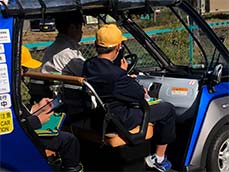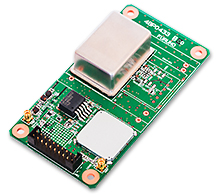Articles for ITS market Human-oriented smart cities are wanted
Digitalization of society must be accelerated to survive COVID-19 outbreak
It is said that the digitalization of Japanese society must be accelerated due to the outbreak of COVID-19. The payments of special benefits by the government were delayed because the digitization of the government procedures has been delayed. The delay of digitalization has also been revealed in telemedicine and online education. The digitalization is urgently needed in many aspects of our daily lives.
However, there are a few movements for digitization actions. We are now in the early stages of rebuilding our economy. The government has begun a concrete discussion on the “GO TO Campaign”, a support policy specifically for the recovery of tourism. This specific economic recovery plan is an important priority. However, when will the discussion for the fundamentals of social digitization begin?
Smart City project and MaaS
The “Smart City” project is being set up to promote the digitization of society. The government defines smart city as an "urban design that uses AI and big data to fundamentally change the ways of society". It is necessary for this project to make effective use of data which is related to our work and overall life, such as administrative procedures, energy management, telemedicine, nursing care, distance education, cashless payment, and automatic delivery.
We must be patient until society is digitalized sufficiently. Even if the government subsidy succeeds in operating in a specific region, it is difficult to accomplish this in all other areas as well. It is important for a city to re-acknowledge its own challenges and implement smart city capabilities individually.
 Demonstration experiment of autonomous driving in Eiheiji
Demonstration experiment of autonomous driving in Eiheiji
 Students participating in the demonstration experiment (Eiheiji city)
Students participating in the demonstration experiment (Eiheiji city)
People are the protagonists. Second stage of Maas
MaaS has gained popularity as a part of the smart city culture. The Japanese government has been financially supporting MaaS projects managed by local governments and companies since last year (2019). Support will be increased and strengthened this year (2020). Last year, financial support was mainly provided for business verifications, however this year, a subsidy of 10 to 30 million yen per project will be granted for business development.
Last year's support was mostly for study of public transportation apps and payment apps using smartphones. However, the target of this year is related to demonstration experiments utilizing mobile data that will lead to the realization of smart cities.
I also act as a consultant serving Eiheiji city in Fukui prefecture, where they want to implement MaaS service locally. One of the characteristics of Eiheiji city is the high penetration ratio of cable TV. Taking advantage of this strength, we plan to establish a virtual platform for remote video communication among the residents.
Smart city and MaaS are a means of data collection and data analysis. The purpose is to improve people's life through the data digitalization. When we promote smart cites, we should consider the ideal ways for a human-oriented society.
Writer introduction

Mr. Kenji Momota Automotive journalist
His major is the world automotive industry and he is also familiar with the energy industry, IT and the aging society problem as the related fields. He acts around the world based in Japan and USA and writes for the general magazines, the technology journals and the automotive related media etc.
He is also commentator of motor race and world's motor show on TV program based on his career of the driver of Indy Racing League and NASCAR. In recent years, he has been covering about a paradigm shift from developed countries to developing countries, the motorized vehicle like EV and the telematics.
FURUNO ITS Journal
Click here for the latest articles after 2022 (in Japanese)2022
- The "realistic" self-driving roadmap shown by the Japanese government and a hands-on report on the latest Subaru EyeSight X
- Will FCVs (Fuel Cell Vehicles) Become Popular? ~New Movement in Toyota and Honda~
- The 'Complete' online sales of new cars start in Japan. Will this new way of buying cars take root?
- Many Firsts! On-Site Report from Tokyo Auto Salon 2022 - The author, who knows what goes on behind the scenes, looks back on 40 years of history. -
2021
- "Moving toward zero traffic fatalities for four-wheeled and two-wheeled vehicles globally in 2050" ~Experience on Honda's latest safety technologies~
- Tsuneishi Shipbuilding's building and DX, an exclusive visit to the main factory
- Japan's Smart City: New Moves toward Practical Use
- When will self-driving buses (service cars) be put to "full-scale" practical use?
- Utilization vehicle data during disasters
- Toyota-led Connected Technology to Transform Commercial Vehicle Business -From light trucks to large trucks and buses-
- Toyota enters the connected car "Personalization" business
- Japanese automakers' carbon-neutral strategies swept up in ESG investment
- Drive experience of the latest autonomous vehicle models and advanced driving support systems
- Will carbon neutrality accelerate the trend to strengthen LCA (Life Cycle Assessment)?
- Semiconductor shortage exposes realities of the automotive industry
- Online Autonomous Driving Contest Enhancing development of Human Resources
2020
- What happens to CASE when gas cars are banned in Japan?
- When will Flying Cars be launched?
- Expectation vs. reality:Autonomous Driving in Japan
- V2X, Becoming increasingly important in autonomous driving
- Technology of Subaru “EyeSight X”
- Lifestyle-oriented French cars gain popularity in Japan
- Human-oriented smart cities are wanted
- MaaS and CASE, how would automotive industry change after COVID-19?
- The beginning of virtualization era, triggered by COVID-19
- Trend of EV shift and consumer demands
- TOYOTA Press conference about ADAS - Releasing algorithm for "sudden acceleration suppression during attempted sudden acceleration" free of charge -
- The Japanese automotive industry in 2020 - 3 turning points -
- "Using a smartphone while driving" and "Level 3 automated driving"
2019
- Motor show business model is at a turning point - Tokyo Motor Show Report -
- Commercialization and monetization of MaaS - ITS World Congress Singapore Report -
- Android Automotive pays attention to V2X - Report from the Frankfurt Motor Show 2019 in Germany -
- Automobile Distribution Revolution and DCM (Data Communication Module)
- Connected business potential and newly proposed "eMaaS" by Honda
- 5G services for practical use are multiplying
- Connectivity technologies attracting attention due to frequent traffic accidents
- Shanghai Motor Show report -SUV, EV, Automated car & 5G-
- Drone Business roadmap and updates to Michibiki (Quasi-Zenith Satellite System)
- MaaS (Mobility as a Service) "town development." Full-scale promotion for a national project
- CES organizer states "Data Period in 2020s." Transformation of the Automotive Industry in CES, US "-CES2019 Report-"
- "Return to Origin" directed towards the age of change, automatic operation and connectivity
2018
- New proposal for Private Car Automated Driving Level and other Hot 5G Technology Topics
- Standardized EV charging infrastructure concerns in Europe, US, Japan and China - Kobe EVS 31 field report -
- Touring a pure car carrier and a test drive of the latest hybrid car
- Planning stage products are exhibited at the newly established visualized mobility service "TOYOTA MOBILITY SHOWROOM".
- Potential “Community Car-share” program promoted by local residents
- CES Asia Report 2108
- Companies attempt new Vehicle-to-Infrastructure communications, including traffic volume measurements and vehicle positioning. -ITS Asia Pacific Forum in Fukuoka-
- Geneva show in Switzerland. Flying cars and MaaS (Mobility as a Service) were hot topics.
- EV (Electric Vehicle) proposals by country
- MaaS competition through service mobilization, M & A and technical field collaboration is accelerating. - The CES 2018 Report -
2017
- Big data’s initiative and fight for the automotive industry. Cooperation among companies becomes increasingly important.
- Connected car and road-to-vehicle communication automatic operation
- ETC (Electronic Toll Collection) and ETC2.0. Current situation and projected future
- Rapid development of sharing economy
- Germany is first to recognize level 3 automated driving
- ITS EU 2017 Field Reports -Automatic Operation and the eCall-
- From Infotainment to ITS, the competitive area is spreading in the car big data industry.
- GTC (GPU Technology Conference) Report and the de facto standardization of AI (artificial intelligence)
- Renesas' new challenge! "e-AI Solution" and "Renesas Autonomy"
- The Automobile industry is shifting from a manufacturing industry to a service industry.
- The movement toward accident countermeasures for aging drivers in Japan
- Fusion of ride sharing and fully automated driving is advancing in the USA.
2016
- Overview of the Quasi-Zenith Satellite System (QZSS) and advancements toward full-scale practical use including the Tokyo Olympic Games - G-space EXPO 2016 report-
- Japan’s automated driving project "SIP-adus" will be a large demonstration experiment.
- The International Home Care & Rehabilitation Exhibition. There were many car manufactures with exhibits booths at this show.
- Japanese car manufacturers starting to concentrate on strengthening the ADAS system
- A new movement of legislation for autonomous cars
- Cyber Security and “AGL”, the new OS for automotive are hot topics in the connected car industry
- “High precision 3D map” the key future of autonomous car and pedestrian dead reckoning
- Chinese “BAT” is accelerating their business in the EV (Electric Vehicle) market
- Tesla's original connection to Taiwan and the new transportation system technologies.
- "The main topic" of the Geneva Motor Show was how to strengthen "pedestrian protection"
- The probe data business is getting more competitive
- Reporting directly from the 2016 CES show "Data services will soon become the main revenue source of automotive industry"
2015
- Do the automated driving systems need the GNSS (Global Navigation Satellite System) ?
- ETC Version 2.0 is coming soon. A new service was announced at the Tokyo Motor Show and the possibility that is could be used as a device for older drivers.
- "Connected Horizon" and "eHorizon". Germany's leading parts supplier accelerates strengthening of "Big Data" for business



 Toyota's smart city Initiative: Woven City
Toyota's smart city Initiative: Woven City GPS/GNSS Receiver&Chips and Modules (positioning and timing)
GPS/GNSS Receiver&Chips and Modules (positioning and timing)